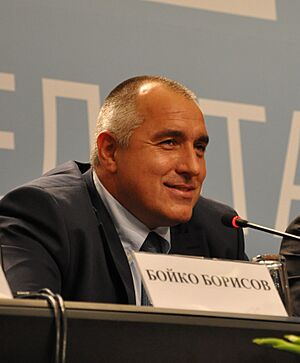Boyko Borisov facts for kids
Quick facts for kids
Boyko Borisov
|
|||||||||||||||||||||
|---|---|---|---|---|---|---|---|---|---|---|---|---|---|---|---|---|---|---|---|---|---|
| Бойко Борисов | |||||||||||||||||||||
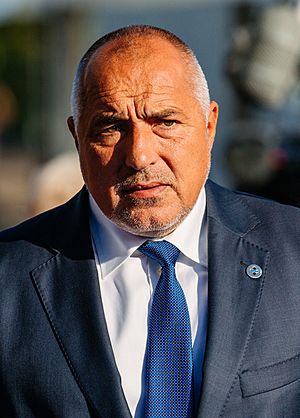
Borisov in 2017
|
|||||||||||||||||||||
| Prime Minister of Bulgaria | |||||||||||||||||||||
| In office 4 May 2017 – 12 May 2021 |
|||||||||||||||||||||
| President | Rumen Radev | ||||||||||||||||||||
| Deputy |
See list
|
||||||||||||||||||||
| Preceded by | Ognyan Gerdzhikov | ||||||||||||||||||||
| Succeeded by | Stefan Yanev | ||||||||||||||||||||
| In office 7 November 2014 – 27 January 2017 |
|||||||||||||||||||||
| President | |||||||||||||||||||||
| Deputy |
See list
|
||||||||||||||||||||
| Preceded by | Georgi Bliznashki | ||||||||||||||||||||
| Succeeded by | Ognyan Gerdzhikov | ||||||||||||||||||||
| In office 27 July 2009 – 13 March 2013 |
|||||||||||||||||||||
| President | |||||||||||||||||||||
| Deputy |
See list
Simeon Dyankov
Tsvetan Tsvetanov |
||||||||||||||||||||
| Preceded by | Sergey Stanishev | ||||||||||||||||||||
| Succeeded by | Marin Raykov | ||||||||||||||||||||
| Member of the National Assembly | |||||||||||||||||||||
| Assumed office 12 April 2023 |
|||||||||||||||||||||
| Constituency | 16th MMC – Plovdiv | ||||||||||||||||||||
| In office 21 May 2013 – 7 November 2014 |
|||||||||||||||||||||
| Succeeded by | Anna Aleksandrova | ||||||||||||||||||||
| Constituency | 25th MMC – Sofia | ||||||||||||||||||||
| Leader of GERB | |||||||||||||||||||||
| Assumed office 10 January 2010 |
|||||||||||||||||||||
| Preceded by | Tsvetan Tsvetanov | ||||||||||||||||||||
| Mayor of Sofia | |||||||||||||||||||||
| In office 10 November 2005 – 27 July 2009 |
|||||||||||||||||||||
| Preceded by | Stefan Sofiyanski | ||||||||||||||||||||
| Succeeded by | Yordanka Fandakova | ||||||||||||||||||||
| Personal details | |||||||||||||||||||||
| Born |
Boyko Metodiev Borisov
13 June 1959 Sofia, PR Bulgaria |
||||||||||||||||||||
| Political party | GERB (since 2006) | ||||||||||||||||||||
| Other political affiliations |
|
||||||||||||||||||||
| Spouse |
Stela Borisova
(divorced) |
||||||||||||||||||||
| Children | Veneta Borisova | ||||||||||||||||||||
| Alma mater | Academy of the Ministry of Interior, in Sofia | ||||||||||||||||||||
| Signature |  |
||||||||||||||||||||
|
Association football career
|
|||||||||||||||||||||
Boyko Metodiev Borisov (born 13 June 1959) is a Bulgarian politician. He served as Prime Minister of Bulgaria three times, for a total of nine years between 2009 and 2021. This makes him the longest-serving Prime Minister in Bulgaria since the end of the communist era.
Borisov is a member of the GERB party, which he founded and still leads. Before becoming Prime Minister, he was the Mayor of Sofia from 2005 to 2009. He is still active in politics and is currently a Member of the National Assembly.
Borisov was first elected mayor of Sofia in 2005. In December 2005, he helped start the political party called Citizens for European Development of Bulgaria (GERB). He became the party's main candidate in the 2009 general election. GERB won by a lot in 2009, beating the Socialist Party. Borisov then left his job as mayor to become Prime Minister.
He resigned in 2013 after many people protested about government policies. But he led GERB to win the 2014 general election, and he became Prime Minister again. His second term ended like his first, when he resigned in January 2017. This time, it was after GERB lost the 2016 presidential election. Just like before, Borisov led GERB to win the snap 2017 general election, and he became Prime Minister for a third time.
During Borisov's time as Prime Minister, Bulgaria's economy became more stable. However, it remained the poorest country in the European Union. Many people in Bulgaria lived below the national poverty line.
In 2013, Borisov became the oldest person to play for a professional Bulgarian football club. He played for FC Vitosha Bistritsa in the second division of Bulgarian football.
Contents
Early Life and Family Background
Borisov was born in 1959 in Bankya, which is now a town near Sofia. His father, Metodi Borisov, worked for the Ministry of Internal Affairs. His mother, Veneta Borisova, was an elementary school teacher.
In 1977, Borisov finished high school in Bankya with excellent grades. From 1982 to 1990, he worked in the Ministry of Internal Affairs as a firefighter. Later, he became a professor at the Police Academy in Sofia. He also taught at the Higher Institute for Police Officers Training from 1985 to 1990.
Borisov left the Ministry in 1991. He then started his own private security company called Ipon-1. He worked as a bodyguard for Bulgaria's last communist leader, Todor Zhivkov, and later for Simeon II. Borisov has said he took part in karate championships since 1978. He also coached the Bulgarian national team and was an international referee.
Borisov is divorced. He has a daughter named Veneta from his previous marriage. He also has a sister, Krasimira Ivanova.
Career as a Public Official
Boyko Borisov served as the Chief Secretary of the Bulgarian Ministry of Interior from 2001 to 2005. During this time, he gained recognition for helping to catch a well-known criminal. He held the rank of General.
In the 2005 parliamentary elections, he ran for parliament with the National Movement Simeon II party. He was elected in two areas but chose to keep his job as Chief Secretary. Later in 2005, he resigned from that role to run for mayor of Sofia. He won the election and became Mayor, taking over from Stefan Sofiyanski. He was re-elected as mayor in 2007.
First Term as Prime Minister (2009-2013)
Borisov's party, GERB, won the parliamentary election on 5 July 2009. They received almost 40% of the votes and 117 out of 240 seats in parliament.
Starting on 27 July 2009, Borisov served as Prime Minister of Bulgaria. His government was led by GERB and had support from other groups in parliament. He brought in several experts who were not part of a political party. These included Simeon Dyankov, a former high-ranking official from the World Bank, and Rosen Plevneliev, who managed a large German company in Bulgaria.
Key Domestic Policies
Borisov's government focused on improving public services and building better infrastructure. A major goal was to expand the national motorway network. The Lyulin motorway was the first new motorway to be finished. The government also created a plan for energy development until 2020. This plan included building gas connections with Greece, Romania, and Turkey. It also aimed to increase the use of renewable energy.
The Borisov government stopped the Belene Nuclear Power Plant project after the Fukushima Daiichi nuclear disaster. The amount of European funds Bulgaria received increased significantly during this time.
Special police actions were taken to address issues in public administration. Some high-profile members of organized crime were put in prison. The government also reintroduced a full smoking ban in 2012. This was done to reduce the number of smokers in the country. By 2013, cigarette sales had decreased by 3-4%.
Following public concerns, Borisov's government banned hydraulic fracturing for shale gas exploration. A permit given to Chevron for shale gas exploration was taken back. Breaking this ban would result in a large fine.
Resignation of the First Government
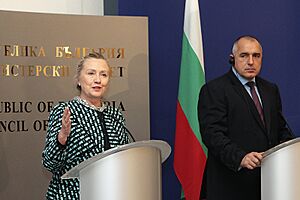
In 2012, France's TotalEnergies energy company received a license to look for oil and gas in Bulgaria's part of the Black Sea. This decision caused a lot of discussion and led to nationwide protests in late 2012 and early 2013.
Following new protests on 12 February 2013, about high energy costs and living standards, Borisov and his government resigned on 20 February. Before this, Borisov had accepted the resignation of Finance Minister Simeon Djankov. Borisov stated, "I will not be part of a government where police are hurting people." The election, which was planned for the summer, was moved up to 12 May 2013.
Second Term as Prime Minister (2014-2017)
Domestic and Foreign Policy
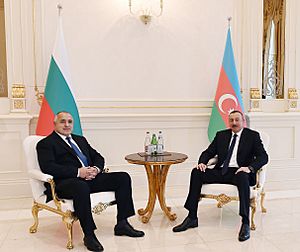
During Borisov's second government, some planned reforms, especially in the justice system and healthcare, did not happen. Bulgaria's parliament also rejected a law aimed at fighting corruption.
The growing of genetically modified crops was banned in 2015.
In foreign policy, Borisov's government saw the cancellation of the South Stream gas pipeline project. Instead, Borisov's government focused on connecting gas pipelines with Romania, Greece, Turkey, and Serbia. This would allow natural gas to come from many different sources.
A fence was built along the border with Turkey to help control the flow of migrants during the European migrant crisis. Border security was also made stronger.
Third Term as Prime Minister (2017-2021)
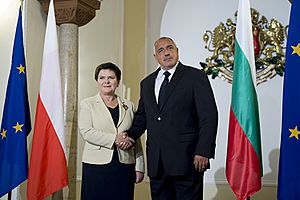
After the 2017 parliamentary elections, Borisov became Prime Minister again for his third term. On 27 April, President Rumen Radev officially asked Borisov to form Bulgaria's new government.
In June 2018, a public tender was started to build a natural gas connection with Turkey. Borisov's plan was to create a Balkan Gas Hub near Varna. This hub would help ensure competition between gas supplies from different countries.
During a regional meeting, Borisov announced that Bulgaria would join Serbia, Romania, and Greece in a bid to host the 2030 FIFA World Cup and the UEFA Euro 2028.
Borisov received the Order of the Republic of Serbia in February 2019. He thanked the Serbian president and promised to help Serbia with its goal of joining the EU.
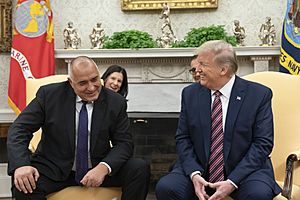
In October 2019, Borisov urged the European Union to stop criticizing Turkey. He added that Bulgaria had good relations with its neighbor, Turkey. However, a few days later, Bulgaria strongly condemned the Turkish offensive into north-eastern Syria and insisted it stop immediately.
On 25 October 2020, Borisov tested positive for COVID-19. He recovered by 10 November. While Bulgaria initially responded quickly to COVID-19 in March 2020, Borisov's handling of the pandemic later received criticism.
After the April 2021 Bulgarian parliamentary election, GERB came in first place, but it seemed unlikely they would form a government. Borisov praised GERB's election performance and offered to cooperate with other parties.
On 7 April, Borisov again criticized other parties for not wanting to work with GERB. However, he surprisingly offered to provide "10 MPs" to support a government formed by Slavi Trifonov.
On 14 April, Borisov confirmed he would not be GERB's choice for Prime Minister in the next round of government formation. On 15 April, Borisov officially submitted his cabinet's resignation to the National Assembly. The resignation was approved the next day. Borisov then took on the role of Acting Prime Minister.
After his resignation was accepted, Borisov said he would "go on vacation." He posted a picture of himself playing football with his two grandchildren on 17 April. On 19 April, Borisov was hospitalized for a knee injury he got while playing football. He was seen walking in the hospital the next day.
On 21 April, Borisov released a video of himself with his dog, Borko, at his home in Bankya. This was seen as a challenge to the National Assembly, which had asked him to appear in parliament that day. Borisov also said he would run in the upcoming Presidential Elections if a Caretaker Government was appointed.
On 12 May, after attempts to form a government failed, Borisov officially stopped being Prime Minister. Stefan Yanev replaced him as caretaker Prime Minister.
Post-Prime Ministerial Political Activity

GERB Party Leadership
On 11 May, just before Borisov's term as Prime Minister ended, he made some changes within the GERB party during their yearly meeting. He also promised to help more young people get involved in the party.
Before the Snap Parliamentary Elections in July, Boyko Borisov criticized the Yanev Caretaker Cabinet. He disagreed with claims that the government budget lacked funds. Borisov also criticized changes made within the public service by the Caretaker Government. He said these changes were made to benefit President Radev.
Borisov had strong disagreements with the Caretaker Minister of Interior, Boyko Rashkov. Borisov accused Rashkov of trying to scare GERB politicians. In turn, Rashkov suggested Borisov might have been involved in certain activities.
On 15 July 2021, Borisov was questioned by members of the Ministry of Interior. Later, on 24 July, Borisov accused Rashkov of trying to intimidate GERB politicians.
Throughout August 2021, Borisov also criticized the political parties in parliament for not being able to form a government.
During the campaign for the Snap Parliamentary Elections in November, Borisov strongly criticized the Yanev Caretaker Cabinet. He claimed that the Caretaker Cabinet had created a very "difficult crisis." He also suggested that the Caretaker Cabinet was trying to "manipulate" the election results.
Even though he was a main candidate for GERB in all three elections in 2021, Boyko Borisov chose not to become a Member of Parliament.
After the Petkov Government was formed, Borisov often criticized the new government. He especially disagreed with the proposed budget by Minister of Finance, Asen Vasilev. Borisov said it would increase the national debt and threaten Bulgaria's financial stability. He also criticized the government's response to the Russian invasion of Ukraine.
Legal Challenges
On 6 January 2022, Borisov was called for questioning by the Ministry of Interior. This was about an ongoing case related to money matters. Borisov denied all the accusations against him.
On 2 February, Boyko Rashkov, the Minister of Interior in the Petkov government, announced that new information had come to the Ministry about Borisov's activities.
On 17 March 2022, Boyko Borisov was taken in by the Ministry of Interior. This was due to information received from a businessman and from Bulgarian civic groups. His lawyer confirmed that Borisov was being held for questioning.
Borisov was released from questioning on 18 March. He later claimed that his questioning was related to his support for certain political views.
On 5 April, an investigation was started into the possibility of illegal activity surrounding Borisov's questioning. The Sofia Administrative Court later ruled on 23 August that Borisov's questioning had been illegal.
Member of the 49th National Assembly
Borisov is currently a Member of the 49th National Assembly.
Images for kids
-
Borisov with Hungarian Prime Minister Viktor Orbán, September 2010
-
Borisov with Polish Prime Minister Beata Szydło, September 2017
-
Borisov with President of the European Council Donald Tusk, January 2018
-
Borisov with French President Emmanuel Macron, May 2018
-
Borisov with Israeli President Reuven Rivlin, June 2018
-
Boyko Borisov and Angela Merkel
See also
 In Spanish: Boiko Borísov para niños
In Spanish: Boiko Borísov para niños
 | Janet Taylor Pickett |
 | Synthia Saint James |
 | Howardena Pindell |
 | Faith Ringgold |


